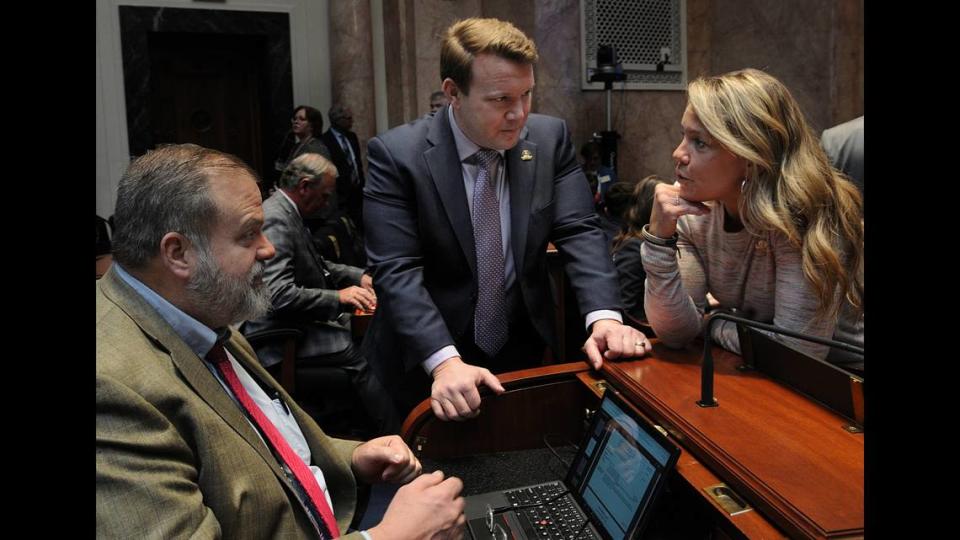KY House sends controversial anti-crime bill to Senate. What changed, what stayed in?
- Oops!Something went wrong.Please try again later.
The Kentucky House made more changes on Thursday to its sprawling, controversial anti-crime package before sending it to the Senate and an uncertain fate.
House Bill 5, called the Safer Kentucky Act, would rewrite much of the state’s criminal code, covering the homeless, shoplifters and vandals as well as carjackers, fentanyl dealers and violent offenders, the last of whom would go to prison for life after “three strikes.”
The overwhelmingly Republican House voted 74-to-22, largely along party lines, to pass the bill after nearly three hours of debate.
Supporters said the bill is an overdue get-tough measure after years of criminal-justice reforms in Kentucky that didn’t put enough emphasis on public safety.
“Soft-on-crime legislation makes (police officers’) jobs harder,” said state Rep. Wade Williams, R-Earlington, a former Madisonville police chief.

“I saw firsthand effects from the prior decriminalization effort from this General Assembly in days past,” Williams said. “I understand their intention was to reduce costs and incarceration. But it had a negative effect on crime-fighting. I believe House Bill 5 will correct some of these issues and these unforeseen consequences.”
But opponents raised a number of concerns about the sweeping package of proposed changes, including its unknown cost to taxpayers and the fact that Kentucky already has one of the highest incarceration rates in the country, with chronic jail overcrowding in many communities.
Sign up for our Bluegrass Politics Newsletter
A must-read newsletter for political junkies across the Bluegrass State with reporting and analysis from the Lexington Herald-Leader. Never miss a story! Sign up for our Bluegrass Politics newsletter to connect with our reporting team and get behind-the-scenes insights, plus previews of the biggest stories.
They particularly objected to sections of the bill letting police fine and arrest homeless people for a newly created offense, “unlawful camping.” Democrats backed a floor motion on Thursday to cut the public homelessness sections of the bill, but the chamber’s Republican majority easily defeated that attempt.
And Rep. Keturah Herron, D-Louisville, criticized a part of the bill that would allow business owners to use “a reasonable amount of force” to protect themselves and prevent the escape of a suspected shoplifter. That risks encouraging violence in stores based on a merchant’s unfounded suspicions about people, Herron said.
There were procedural efforts by House Democrats to divide the bill into smaller segments that could be voted on individually, which the GOP majority also easily rejected.
“We do have about 20 different bills that have been crammed into one,” said state Rep. Sarah Stalker, D-Louisville.
“Unfortunately, this bill lacks a lot in my opinion,” Stalker said. “It lacks compassion for our most vulnerable population experiencing homelessness. It lacks real collaboration with service providers and individuals with lived experiences in areas like substance abuse and re-entry. These groups are closest to the issues, but they’re farthest away from the table where bills like this are being drafted.”
An impact statement prepared by legislative analysts estimated that an earlier version of the bill would bring a “significant increase in operational costs” for local and state governments, largely by putting more people in local jails and state prisons and requiring them to be held for longer.
Thirty-seven parts of the bill would raise incarceration costs, according to the statement, but no estimated total cost was included. The state budget recently proposed by the House would spend $748 million on the Department of Corrections in Fiscal Year 2025 and $778 million in Fiscal 2026, for a two-year total of $1.52 billion.
In the Senate, the bill seems likely to go to the Senate Judiciary Committee. The chairman, Republican Whitney Westerfield of Fruit Hill in Christian County, long has been an outspoken criminal-justice reform advocate.
Westerfield told the Herald-Leader Monday that he has asked for his panel to get the bill. At that time, Westerfield said he hadn’t had a chance to read the 72-page version of the bill passed by the House Judiciary Committee last week, but he is familiar with previous versions and has spoken with its sponsor.
“The bill is not as bad as I feared, but it still has provisions that need some more work,” Westerfield said.
On Thursday, the House approved an 11-page floor amendment sponsored by the bill’s lead sponsor, Republican Rep. Jared Bauman of Louisville, that made a number of additional changes to the bill.

As amended, the bill would allow Kentuckians to sleep in vehicles in public for up to 12 hours without facing the newly created unlawful camping charge aimed at homeless people. In the previous version of the bill, sleeping in vehicles in public would have been prohibited.
The amendment would expand the definition of “violent offenses,” for which offenders must serve most of their prison sentences, to include first-degree burglary if someone other than the burglar is present at the scene; first-degree wanton endangerment; second-degree robbery; first-degree strangulation; carjacking; and first-degree arson.
It also would add fentanyl and fentanyl derivatives to Kentucky’s “Good Samaritan” law, which is intended to provide immunity from prosecution for drug crimes when people call the authorities to report a drug overdose.
Among its many objectives, the bill would:
Create a “three strikes and you’re out” law. Kentuckians convicted of violent felonies on three separate occasions would face life imprisonment with no possibility of parole for the third offense.
Add attempted murder to the violent offender statute, which would require anyone convicted of the crime to serve most of their sentence before they are eligible for parole.
Elevate criminal charges by one offense level for adults convicted of engaging in a conspiracy with minors.
Expand Kentucky’s death penalty eligibility to include murder of a “first responder” — such as a police officer, firefighter or emergency medical worker — who was killed in the line of duty.
Elevate the offense of first-degree fleeing or evading police from a Class D to a Class C felony and require at least half of the prison sentence to be served before parole eligibility.
Deny probation, parole or any other form of conditional release for people convicted of a crime in which they possessed a gun in violation of state law, including felons in possession of a gun or guns that were stolen, defaced or loaded with restricted ammunition.
Require at least one parent or guardian to attend a youth’s juvenile court hearings, or else be fined $500 and ordered to perform 40 hours of community service.
Expand the definition of manslaughter to include the sale of fentanyl or fentanyl derivatives if the use of the drug by the buyer led to their death.
Elevate the offense level for people convicted of bringing fentanyl or fentanyl derivatives into a jail or prison, from the current Class D felony to a Class B felony.
Create the Class B felony of carjacking, or stealing someone’s motor vehicle away from them by means of force or intimidation.
Expand the felony and misdemeanor criminal mischief laws to include vandalism with property damage of $500 or more, although vandals could reduce their punishments by repairing or replacing the damaged property.
Create the crime of unlawful camping for homeless people who remained on streets, sidewalks, parks, under bridges or blocking entrances to homes, businesses or public buildings, with the intent to sleep or camp. A first offense would be a violation, which could bring a $250 fine. Future offenses would be a Class B misdemeanor.
Clarify a “shopkeepers privilege” that would allow business owners and their employees to use “a reasonable amount of force necessary” to protect themselves and prevent the escape of a suspected shoplifter they’ve detained or the loss of goods from their businesses. This is intended as a criminal and partial civil shield.
Prevent charitable bail organizations, such as the nonprofit Louisville Bail Project, from posting $5,000 or more in bail to secure an inmate’s release from jail. It also would prohibit the nonprofit groups from posting bail for inmates charged with certain crimes, such as domestic or dating violence or felonies designated as violent offenses.
Sweeping anti-crime bill to protect KY from ‘criminal element’ advances to House
Critics say KY House bill ‘criminalizes poverty’ with penalties for homelessness

